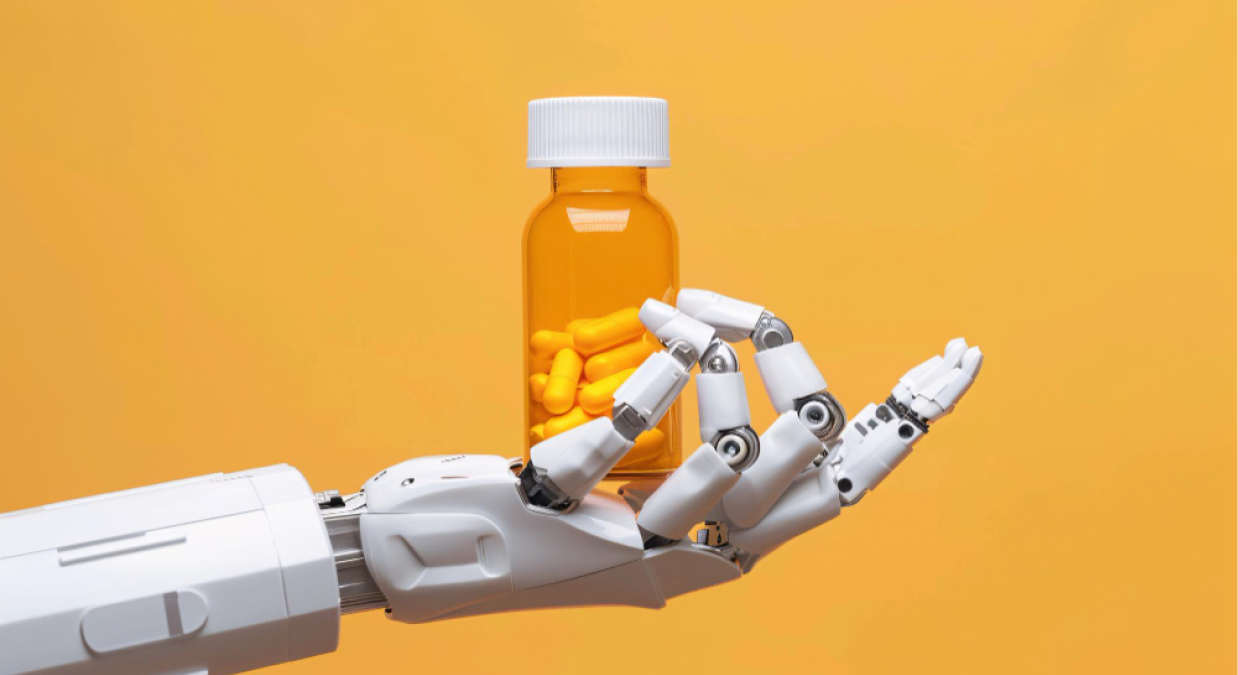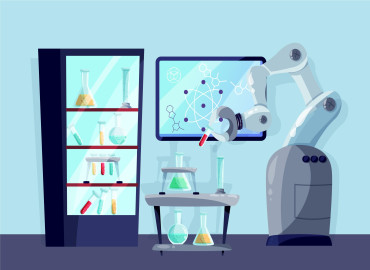by Michael Bani
7 minutes
AI and Data Science in Nutraceutical Product Development
Discover how AI and data science are shaping the future of nutraceuticals—from personalized protocols to smart supplement ecosystems.

It started with a simple question: "Why doesn’t this supplement work for me?"
For years, nutraceutical companies created products based on general assumptions: average nutrient needs, broad claims, and one-size-fits-all formulations. However, in 2025, everything is changing. The rise of AI in nutraceutical development is transforming the industry with personalized nutrition solutions that cater to individual needs. From DNA kits that analyze genetic predispositions to predictive analytics that tailor supplement stacks based on comprehensive data, AI is rewriting the rules of science-backed supplementation.
Meet Rhea, a 33-year-old tech consultant in Bengaluru. Instead of picking a random multivitamin, she submitted her saliva sample for microbiome testing, synced her wearable data integration, and received a custom supplement protocol—backed by scientific evidence for nutritional claims and adjusted monthly.
Welcome to the future of smart supplementation, where advanced nutrient delivery systems enhance efficacy while ensuring waste reduction and fraud detection and security. As we explore the future trends of India's nutraceutical industry, it's clear that data-driven clinical trials in nutraceuticals and biomarker identification for nutraceutical efficacy with AI tools are reshaping how we understand health maintenance and disease prevention.
Additionally, analyzing market trends and consumer insights through AI tools in the nutraceutical sector will become essential for brands looking to thrive in this dynamic landscape. And for those interested in holistic wellness, it's crucial to learn about the role of bioactive compounds in health maintenance and disease prevention.
The Need for Personalization in Nutraceuticals
Traditional supplements cater to the masses, but health is deeply individual. Factors that influence nutrient needs include genetic factors in nutrient needs such as genetics (e.g., MTHFR gene and folate absorption), microbiome composition, age, gender, and lifestyle habits, as well as underlying health conditions.
AI enables brands to move from generic supplements to precision nutrition by analyzing these multi-layered data sets and recommending individualized supplement protocols. Through AI-driven nutrition recommendations, companies can better understand how factors like microbiome composition and genetic variations affect each person's unique dietary requirements.
As the nutraceutical market in India expands, exploring consumer trends demanding science-backed natural food products becomes essential. High-throughput screening and clinical trials play a crucial role in biomarker identification, ensuring that new products not only meet health standards but also provide the health benefits of natural ingredients.
Moreover, market trend analysis using AI tools in nutraceuticals allows for the integration of functional ingredients that address specific health concerns while adhering to regulatory compliance. This process can be further enhanced by exploring how regulatory compliance is managed through automation powered by AI.
Finally, as the industry evolves, dynamic pricing strategies will be vital in offering tailored solutions that resonate with consumers seeking personalized dietary therapy options.
How AI Is Transforming Nutra R&D
AI is no longer limited to Silicon Valley. In nutraceutical research and development, it’s driving major shifts in:
1. Ingredient Selection with AI
Machine learning algorithms scan thousands of clinical studies to:
- Identify synergistic ingredient combinations
- Predict effective doses
- Filter out interactions or side effects
- Ensure food ingredient safety and stability
This process, known as clinical study scanning, allows researchers to make informed decisions about functional ingredients that address specific health concerns, including chronic diseases.
2. Formulation Optimization
AI models help optimize:
- Absorption rates (e.g., liposomal vs capsule)
- Stability under different storage conditions
- Delivery formats (e.g., strips, sprays, gummies)
By analyzing market trend data and utilizing literature review automation, these models ensure that formulations meet consumer demands while adhering to AI regulatory compliance in the nutraceutical industry.
3. Speed to Market in Nutraceuticals
By simulating efficacy scenarios digitally, AI reduces trial-and-error cycles, bringing products to market faster. This increased speed to market allows companies to respond swiftly to emerging trends and consumer needs.
4. Continuous Improvement of Products
AI systems can use real-world feedback to refine formulas based on user outcomes—turning the product into a living, learning solution. Techniques such as contaminant and adulterant detection using AI technologies ensure that quality remains high throughout the production process.
Additionally, digital health platforms for personalized nutrition are reshaping how consumers interact with nutraceuticals, allowing for tailored experiences that adjust based on individual responses.
Data Science Applications in Nutra Innovation
Data science plays a crucial role in nutraceutical innovation by complementing AI in understanding large-scale user data analysis across digital health platforms, wearables, apps, trials, and ecommerce platforms. This integration is essential for shifting from products to platforms in the supplement industry.
Key Use Cases:
- Cluster analysis: To segment users by nutrient deficiencies and tailor Functional Food Ingredients accordingly.
- Predictive modeling: To forecast supplement outcomes by biomarker trends, utilizing predictive modeling in supplements to enhance efficacy.
- Personalization engines: To match ingredients with user goals (e.g., energy, sleep, focus) through personalization engines for nutrients that consider individual health profiles.
- A/B testing: To optimize packaging, dosage formats, and delivery timing while implementing A/B testing in nutraceuticals to assess consumer preferences effectively.
By leveraging data science in nutraceutical development, supplement brands can ensure regulatory compliance, detect contaminants and adulterants, and improve automated quality control with AI in production lines. Additionally, understanding the role of AI in accelerating nutraceutical R&D processes allows for high-throughput molecular characterisation and effective ingredient validation.
Furthermore, AI-powered chatbots for customer engagement can personalize interactions based on user data analysis, while discovering supply chain optimization techniques enabled by artificial intelligence ensures efficiency and transparency.
As the industry evolves, it’s essential to explore challenges and advancements in translational nutrition studies that inform best practices in ingredient selection and formulation.
Example: A Smart Supplement Journey
Rhea’s smart supplement journey begins with:
- A DNA kit that reveals her B12 absorption is poor, highlighting the importance of personalized supplement protocols.
- A gut microbiome test showing low bifidobacteria, essential for understanding metabolic conditions like Diabetes and Obesity.
- An app that monitors her sleep and step count, utilizing biometric data analysis to track her overall health.
Based on this information, her protocol includes:
- Liposomal B12 + iron to enhance absorption and support energy levels.
- Prebiotic powder + strain-specific probiotics aimed at restoring gut health and improving nutrient absorption.
- Adaptogens for circadian rhythm support, helping to regulate sleep patterns and reduce stress.
This tailored approach ensures that Rhea's nutritional intervention studies standardisation is effective and responsive to her changing needs. The protocol is adjusted every 60 days based on new biometric data and self-reported energy levels, allowing for predictive maintenance in her health routine.
By integrating high-throughput screening technologies in nutraceuticals, Rhea can identify benefits and applications that enhance the efficacy of her supplements while ensuring quality control. Additionally, the use of chatbots and virtual assistants streamlines her experience, providing timely information and support throughout her journey.
As she navigates this process, Rhea remains aware of future growth trends and technological advancements shaping India’s nutraceutical industry, learning how AI enables personalized nutrition products and understanding customized batch production capabilities with AI support.
Key Differences Between Traditional and AI-Driven Nutra Development
Feature Traditional Nutra Model AI-Driven Nutra Model Formulation Basis
RDA & generic consumer trends
Personalized data in formulations, biometrics
Testing
Manual, trial-and-error
Simulation-based optimization
Product Types
Capsules, tablets
Gels, strips, patches, smart kits, new product types in nutraceuticals
Feedback Mechanism
Customer reviews
Real-time feedback mechanisms, real-time app and biomarker input
Update Cycle
Static products
Dynamic, algorithm-updated blends
This table highlights the key differences between traditional vs AI-driven nutra development, showcasing how personalized nutrition solutions using AI are revolutionizing the industry.
The Rise of Supplement-as-a-Service (SaaS)
AI is giving rise to a new category: not just products, but ecosystems—particularly within the Supplement-as-a-Service (SaaS) model. This innovative approach is transforming how we think about nutrition and wellness.
Brands are offering:
- Personalized onboarding in supplements via quiz + biometrics
- Monthly subscription refills that adapt to individual needs
- In-app tracking and coaching to support behavior change integration in wellness
- Rewards for consistency and journaling
These platforms integrate supplementation, behavior change, and diagnostics—becoming long-term partners in wellness. By leveraging AI in nutraceutical development, they ensure process optimization and utilize dynamic pricing strategies that respond to market demands.
Additionally, advanced techniques like Liquid Chromatography-Mass Spectrometry (LC-MS/MS) and Inductively-coupled Plasma Mass Spectrometry (ICP-MS) are essential for biomarker identification and discovering how drug-nutrient interactions are analyzed using AI.
As these ecosystems evolve, targeted advertising powered by artificial intelligence will tailor experiences based on predictive modeling for health outcomes, ensuring that each individual's journey is unique and effective.
Challenges and Considerations
Despite its promise, AI-led nutraceutical development faces several challenges:
- Data privacy concerns: Handling genetic and health data requires tight compliance with regulatory standards to ensure data protection.
- Regulatory ambiguity: Many personalization claims related to Nutritional Claims are not yet evaluated by FSSAI or global regulators, complicating regulatory compliance in personalized nutrition.
- Cost of entry for personalized protocols: Customized batch production enabled by AI technology may remain inaccessible to lower-income consumers, limiting their access to essential nutrients like Vitamins and Essential Fatty Acids.
- Bias in AI models: The risk of bias in AI models is significant, especially those trained on limited datasets that do not adequately represent diverse populations, such as Indian communities.
These challenges must be addressed for equitable, scalable innovation in the nutraceutical industry. Additionally, considerations like drug-nutrient interaction analysis and supply chain optimization are crucial for ensuring the effectiveness of AI-driven solutions.
Conclusion: Smart Supplements for Personalized Health
The old approach to supplementation was reactive and routine. The new era is characterized by a responsive supplementation approach that prioritizes individual needs.
Artificial Intelligence is helping transform the nutraceutical industry from shelf-based browsing to system-based personalization in nutraceuticals. Consumers like Rhea are no longer asking, "Which supplement is best?" They’re inquiring, "Which one is best for me, right now?" This shift towards algorithm-driven supplement protocols allows for tailored solutions that consider factors like lifestyle and dietary preferences, such as the Mediterranean Diet.
As technology deepens and data becomes democratized, supplement brands must evolve from manufacturers to wellness intelligence providers. This involves investigating ways to optimize nutrient delivery systems with AI algorithms and utilizing virtual screening of nutraceutical compounds with AI to ensure efficacy and safety.
The future of nutraceuticals isn’t about more pills. It’s about smarter protocols empowered by algorithms that facilitate customized batch production and energy-efficient nutraceutical production via AI optimization. These advancements will not only enhance product quality but also improve customer retention strategies by offering personalized e-commerce experiences in nutraceutical sales.
As we move forward, the integration of peptide sequencing and quantification in foods will play a crucial role in developing smart supplements that meet specific health requirements. Additionally, techniques like contaminant detection via AI in analysis processes will ensure that these products maintain the highest standards of safety and effectiveness.
In summary, the next generation of supplementation is here—one that is intricately designed around you and your unique health journey.
FAQs (Frequently Asked Questions)
Q1. How is AI transforming nutraceutical research and development?
AI revolutionizes nutraceutical R&D by enhancing ingredient selection, optimizing formulation, accelerating speed to market, and enabling continuous product improvement.
Q2. What role does data science play alongside AI in nutraceutical innovation?
Data science complements AI through techniques like cluster analysis, predictive modeling, personalization engines, and A/B testing to drive advanced nutraceutical innovation.
Q3. How does AI-driven nutraceutical development differ from traditional methods?
Unlike traditional RDA-based formulations and manual testing, AI-driven development leverages personalized data for formulation, simulation-based testing, innovative product types like gels and smart kits, real-time feedback via apps and biomarkers, and dynamic algorithm-updated blends.
Q4. What is Supplement-as-a-Service (SaaS) in the nutraceutical industry?
Supplement-as-a-Service offers personalized onboarding, monthly subscription refills, in-app tracking, coaching, education, and rewards systems that encourage consistency and journaling for enhanced customer engagement.
Q5. What challenges does the nutraceutical industry face with AI integration?
Key challenges include data privacy concerns, regulatory ambiguity surrounding AI applications, high cost of entry into AI technologies, and potential biases within AI models affecting product efficacy and fairness.
.webp)



